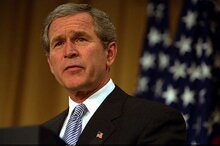 Over the course of the past 6-9 months I have read three books that have affected my view of the current administration in the White House and have also affected my views on leadership. They are The Great Deluge by Douglas Brinkley regarding Hurricane Katrina, State of Denial by Bob Woodward regarding the failures of our Iraq policy, and Tempting Faith by David Kuo, which was about the office of faith based initiatives. All three books, though on completely unrelated topics, show the picture of a detached leader who delegated way too much, did not ask hard questions, and led by giving pep talks to subordinates. After reading this trilogy, I was struck by how similar the observations of these men were, even though they did not work together, had no communication, and shared no common agenda. I came to the realization that our president has led in a very direct way on casting vision, but has been very vague on how that vision is to be accomplished. He's left the execution up to subordinates who have been consistently confused about how things were to be done, who was in charge, what the chain of command actually was, and what the real desires of the president were. Many also had their own agendas that were at odds with the president, but because he never asked questions, he did not know. Time after time, I read about meetings in the White House where people would come out more confused than they went in and our President would do nothing to bring clarity, ask tough questions, or get things moving. From the detachment in the wake of Katrina, to abdicating direction of the Iraq policy to Rumsfeld and Paul Bremer, to mouthing empty slogans on faith based initiatives that were not backed up with substance, one gets the idea that our president has determined ideas but very little ability to get people moving so that things happen the right way.
Over the course of the past 6-9 months I have read three books that have affected my view of the current administration in the White House and have also affected my views on leadership. They are The Great Deluge by Douglas Brinkley regarding Hurricane Katrina, State of Denial by Bob Woodward regarding the failures of our Iraq policy, and Tempting Faith by David Kuo, which was about the office of faith based initiatives. All three books, though on completely unrelated topics, show the picture of a detached leader who delegated way too much, did not ask hard questions, and led by giving pep talks to subordinates. After reading this trilogy, I was struck by how similar the observations of these men were, even though they did not work together, had no communication, and shared no common agenda. I came to the realization that our president has led in a very direct way on casting vision, but has been very vague on how that vision is to be accomplished. He's left the execution up to subordinates who have been consistently confused about how things were to be done, who was in charge, what the chain of command actually was, and what the real desires of the president were. Many also had their own agendas that were at odds with the president, but because he never asked questions, he did not know. Time after time, I read about meetings in the White House where people would come out more confused than they went in and our President would do nothing to bring clarity, ask tough questions, or get things moving. From the detachment in the wake of Katrina, to abdicating direction of the Iraq policy to Rumsfeld and Paul Bremer, to mouthing empty slogans on faith based initiatives that were not backed up with substance, one gets the idea that our president has determined ideas but very little ability to get people moving so that things happen the right way.
When George W. Bush became president, much was made of his managerial leadership style. He was the first Harvard MBA to become president, and he would bring with him a business sense to the executive branch that would be much more effective than the political leaders that have come before him. Well, whatever you think of Bush the Younger personally (I am a lifelong Republican, voted for him twice, and understand that he is an evangelical Christian), it is important to learn from his leadership style, if you can possibly track it.
Initially, he was lauded for his determination, focus, and moral clarity. He had a vision and he executed it. He called those around him to "keep the faith," and "stay the course." He was the ultimate vision caster. He got the vision and he told others where we were headed. In a time of crisis, we all craved this type of direction and decisiveness. Everyone followed him.
But, things did not work out the way that he wanted. The Baker Commission is rumored to be considering bringing in Syria and Iran to help in a possible civil war in Iraq. People died on overpasses waiting 5 days to be rescued from the flood ravaged city of New Orleans. The Faith Based Initiatives Office is now basically defunct and nothing more is being done with the capstone of Compassionate Conservatism. The Republicans lost control of the House and the Senate, not because of liberal media bias, but because of their own corruption, incompetence, and failure to lead properly.
So, what can we learn? Remember, politically, I am a lifelong Republican who does not take the Democratic policies seriously. Some of their policies are immoral, in my opinion, and I could never support a party that that advocates abortion on demand. However, that does not mean that I should not critique and analyze my own end of the political spectrum, ask where God is working, and ask what needs to be learned. Here are some leadership lessons, in my humble opinion:
- Delegate to enable, not to ignore. Harry Truman said, "The buck stops here." To Bush's credit, he has taken responsibility for mistakes made both with Katrina and Iraq. I admire that. However, the reason for the mistakes was that he put people in position and offered no accountablity. He asked no questions. He did not make sure, on any level, that things were happening as they should, until failure was guaranteed. Delegation is good and vital, but we should not use it so that we can just focus on what we want to focus on. The whole task of the organization is important, and as the leader, you are responsible.
- Every vision needs a plan for execution. FEMA had been decimated by budget cuts. There was no plan for the rebuilding of Iraq after the war. Faith Based Initiatives was a lot of talk and little action. We, as leaders, do not need to put forward a vision without some type of reasonal plan to see it come to pass. When that plan is executed, and you assign people to tasks, you need to make sure that you resource the plan effectively. Mere platitudes do not accomplish great dreams. Action does.
- Know your environment and context. Jesus told us to "consider the cost." What is your reasonable chance of success? What are your obstacles? Why has this never been done before? Bush thought that he could superimpose democracy on the Middle East with very little understanding of the authoritarian Muslim Arab culture. The State Department was replaced by the Defense Department in the leadership of the endeavor. We said that because it had happened in Germany and Japan after WWII, it could happen in the Middle East. History will be the judge of this strategy, but at the very least, it did not take into account the culture of the people. Every leadership environment consists of culture and context. You have to know who and what you are working with before you can devise plans to create a preferred future. The Bush Administration seemed to fail at this.
- Get an accurate view of the situation throughout implementation of the plan. In other words, "how are things going?" The plan needs to be held accountable to some type of measurement. Without that, no one knows what is to happen next. What are the goals? What do we need to do to accomplish this? We are finally asking these questions in Iraq, but it is too little too late.
- Define success and fully articulate it to everyone involved. It is demoralizing to work and work with little to show for it and without knowing if you are doing the right thing. From ice trucks stranded in Missouri during Katrina, to miscommunication with generals in Iraq, the Bush administration has consistently been confused about what the goals of the operation were and what defined success. In the same way, we need to know where we are headed, how we get there, and when we have arrived.
- Be flexible and open to change. Every day brings new variables and problems that could not be forseen. It is important to be decisive and stick with your plan, but at the same time, when that plan is no longer working, it is important to assess the situation and make course corrections. This is something that our president was not willing to do until recently, to the great frustration of the American people. He had to lose both houses of Congress before he would reconsider. May we not be so stubborn. It is o.k. to change our course and our strategy. If we are led by defined goals, the most important thing is the destination, not necessarily the route we took to get there.
These are just a few of the lessons that I have learned from watching our executive leader. As I said, I have supported him and I pray for him. I don't think that the Democrats have better ideas. But, the last time I checked, this was America, and it is important for us to learn from our mistakes and apply these solutions to other areas of our lives by asking questions and pointing a better way forward. What about your family? What about your ministry? You job? Your areas of leadership? How can we be more direct and involved in the process to make sure what needs to happen actually happens? Without being micromanagers, how can we all be better leaders so that God is glorified and His purposes are fulfilled through us in our generation? Just some thoughts to ponder.
 I've been interested in the power of networks and network theory for some time now (see a paper I wrote a couple of years ago called Emerging Network Theory). I believe that society is restructuring to a network based, decentralized organizational system as opposed to a hierachical, centralized organizational system. With the speed of information sharing through the internet, the ease of global travel, and the connecting of people with ideas from all over the world, we are truly stepping into a flat world, as Thomas Friedman tells us. This move to an interconnected world where barriers between people groups and nation states are falling is called Globalization.
I've been interested in the power of networks and network theory for some time now (see a paper I wrote a couple of years ago called Emerging Network Theory). I believe that society is restructuring to a network based, decentralized organizational system as opposed to a hierachical, centralized organizational system. With the speed of information sharing through the internet, the ease of global travel, and the connecting of people with ideas from all over the world, we are truly stepping into a flat world, as Thomas Friedman tells us. This move to an interconnected world where barriers between people groups and nation states are falling is called Globalization.









 The other day, Erika and I saw
The other day, Erika and I saw  This past week, I have also been reading
This past week, I have also been reading 
